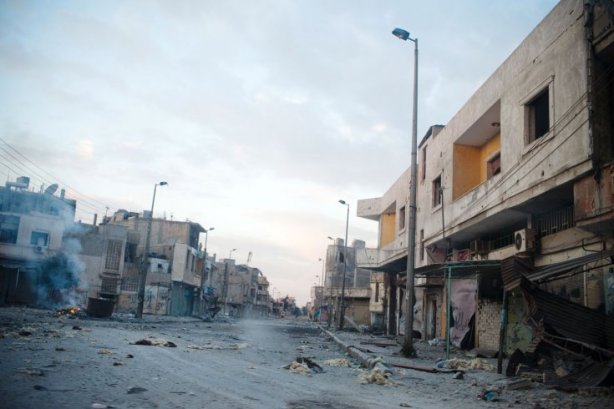
(Posting a school paper as is. No works cited page at the moment. This will be corrected.) Notable sources include Noah Feldman, Michael Walzer, and Jurgen Habermas. All geniuses.
The demand for justice after a terrorist attack on the scale of the 9/11 events may warrant the type of knee-jerk declaration of war (specifically, the War on Terror) that we have seen in the time that followed. The United States government has done a good job of justifying ad hoc its response to the threat of terrorism, with the general consent or indifference of the citizenry. That is, up until recently. Granting that the situations immediately after 9/11 required the United States to enter into a Supreme Emergency modus operandi, it appears the desire for constitutional law to remerge. Now a swell of dissatisfaction, always present but nary as lucid, has begun to make its humanitarian and ethical case against the continued War on Terror. The criticism isn’t so much about lack of necessity for there to be an anti-terrorism force, but that the means and motives by which it is carried out are increasingly malevolent. By reexamining the justifications of certain practices and policies it might be possible to help clarify what values we carry into an effective anti-terror strategy. This might also help to garner popular support for the operations that have become prima facie oppressive or even terrorist-like on behalf of the American agencies engaged in anti-terrorism. The question the US is facing now warrants an answer: Are the affects of anti-terrorism worse than the threat of terrorism?
Even if we had established concrete definitions of war, crime, and terrorism, it would stand to reason that the urgency for an immediate response to 9/11 would force the US to hastily cobble together some kind of argument for going to war in the middle east while still riding high on the surge of retributive justice sought by the people. The state of affairs the United States found itself after the attack was unstable to say the least. Jurgen Habermas recalls, “the repeated and utterly vague announcements of possible new terror attacks and the senseless appeal to ‘be alert’ exacerbated the vague sense of dread and the indefinite state of alarm—in other words, precisely what the terrorists intended” (p4). Justice must also include elimination of the threat. Bringing these terrorists to justice was synonymous with killing them it seemed, and the US saw it fit to blend what ever justification it could find in order to take an action. Feldman writes, “To maximize flexibility, the US government would probably try to give itself the option of invoking either the crime paradigm or the war paradigm at any moment,” (p477).
At the early stages of the War on Terror, it didn’t matter which paradigm of justice the US chose, either treating terrorists like enemy combatants or as criminals though ultimately it adopted the language of war. The US used what ever methods reaped the most desirable goals including torture, indefinite detention without trial, drone strikes, etc. This is reason enough to invoke a philosophy of consequentialist considerations with regards to justifying how the US has acted in the past, and how it can defend decisions and actions going forward. While it is true, as Walzer critiques, that consequentialism can’t assign exact values to what aspects of anti-terrorism should be measured and how heavily, it does establish polar extremes from which to avoid or achieve. Without much valediction, reducing superfluous civilian killing, financial cost, and oppression and fear can be seen as morally sound principles. If there was a need for this excess in the past to bolster the might of a culture that won’t be bullied by terrorism, that time has apparently now passed. While apparently effective, as we have seen with the death of Osama bin Laden, and the lack of fulfilled terrorist attacks, it can be equally argued that the methods of effective anti-terrorism is police-like. The US can raise its level of legitimacy by reenacting the rules of law, and relinquishing the policies of emergency ethics.
The arguments over whether a terrorist should be granted the rights of a criminal can tip the scales with regards to the legitimacy of the anti-terrorism movement. By subjectively assigning the identity of terrorists to the category of enemy combatants, the US burdens itself with a heap of moral risk. Firstly, it is not all together clear that terrorists are enemy combatants of war. Under Just War theory, there must be a cohesive body for which to wage war against and according to Noah Feldman, “The terrorist mastermind…is different with respect to provenance than a general who plans an attack that will be made on the U.S. by an army attacking from without,” (p469). In the case of a homegrown lone terrorist, it would seem strange to declare war on him/her. It is also unclear that a terrorist, in this case al Qaida, represents the ideologies of a legitimate state. Just war would necessitate that there would need to be a reachable peace and a political body to negotiate with, amongst other criteria, that rule out fundamentalist-based terrorism. This example rules out 2 out of 4 of Feldman’s criterions for determining whether a terrorist is an enemy combatant: provenance and identity. The remaining two of Feldman’s criterions that help to support the idea that they are indeed enemy combatants seem pyrrhic in their victories. The intentionality of a terrorist to discredit a state or not recognize it as legitimate is only nominally important in that there is no reason to take their intention seriously once terrorism is used—they have disqualified themselves by their sheer abhorrent and immoral nature. The scale quality says that the magnitude of a terrorist attack might push a regime over the threshold of criminal to enemy combatant, but the threshold seems morally arbitrary. Secondly, the policies of pursuit with regards to enemy combatants, “shoot first and ask questions later,” give rise to a host of human rights violations that serve to undermine favorability to the continuation of warring with terrorists. By a systematic gathering of intelligence, pursuit, and execution, there is an engine of assault without a check or balance to determine whether each strike is worth investing in. Now we are forced to look at the policy as a whole. Lastly; the unilateral practice of using torture, drones, and indefinite detention as tools of waging war raises the culpability for impeccable accuracy to a near implausible standard. Michael Walzer describes the ethics of anti-terrorism and puts it lightly when he writes, “The terrorists hold that there is no such thing as ‘collateral’…damage. All the damage for them is primary…The more deaths the more fear. So anti-terrorists have to distinguish themselves by insisting on the category of collateral damage, and by doing as little of it as possible” (p9).
In order to maintain legitimacy, it is absolutely crucial that the US does not act terroristic while combating terrorism in this way. In defending the potentiality for collateral damage for drone strikes, the US has painted all people associated with a potential terrorist, as potential terrorists. Whether terrorists are or aren’t enemy combatants, it must be said that the term “innocent” is not up for mitigation. Walzer writes, “[Innocents] are ‘innocent’ whatever their government and country are doing and whether or not they are in favor of what is being done,” (p1). It is in this way, that even consequentially speaking, it is damning for the US to continue the War on Terror and instead adopt a policing policy of anti-terrorism. If the methods of anti-terrorism as they are carried out now continue, then the western world serves to embolden the fundamentalist terrorist and public sympathies within their influence. Walzer continues on this theme in another work, “repression and retaliation [of terrorism] must no repeat the wrongs of terrorism, which is to say that repression and retaliation must be aimed systematically at the terrorists themselves, never at the people for whom the terrorists claim to be acting,” and later on, “The refusal to make ordinary people into targets, whatever their nationality or even their politics, is the only way to say no to terrorism. Every act of repression and retaliation has to be measured by this standard,” (p60-61). While being interviewed, Habermas makes the same point, “the state runs the risk of being discredited by the inappropriateness of the measures it deploys, whether internally by militarization of security that undermines the rule of law or externally by mobilizing a disproportionate and ineffective military and technological supremacy,” (p8). This language rises in the minds of anyone who travels the awful banality of the TSA. Without the moral high ground, anti-terrorism begins to look like oppression or terrorism in kind.
The War on Terror, while initiated on emergency standards of supposed necessity can be justified only through a consequentialist view. All things considered, the best course of action was to suspend the status quo of natural or constitutional law to achieve a certain goal. Ostensibly, the threat of utter catastrophe has subsided and now we must change gears as well. Consequentialism with the goal of establishing a world with the greatest amount of well being for all, offers the ability to evolve in light of new evidence and circumstances. As it has become blatantly evident that our practices directly related to our war-like approach to anti-terrorism has undermined our legitimate claim to just war, or justice in general, then it becomes increasingly necessary to adopt a criminal approach. With considerations to a more global society, it might be finally time to take a supranational justice system seriously. Globalization has rendered the inherent value of our borders worthless. The moral weight of killing citizens (read as innocents) in another country that happens to harbor terrorists is equally immoral as killing our own.



